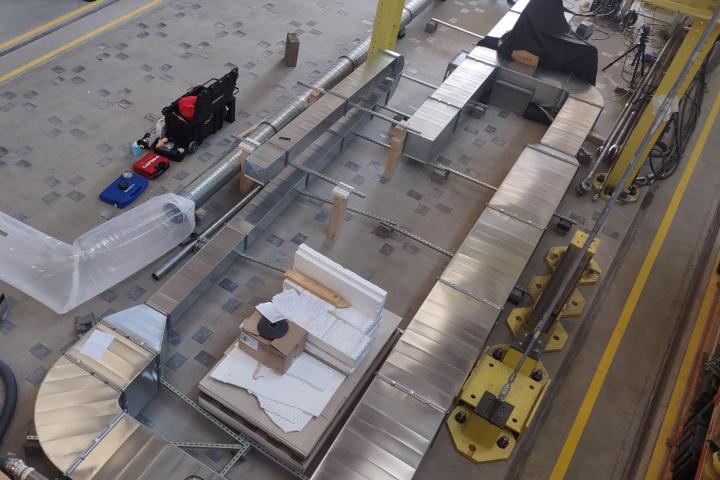
The experimental validation of the AEROSEAL technology, which was carried out by the Indoor Environment of Buildings research team from CTU UCEEB, took place in two phases. The first was to evaluate the air duct leakage before and after the application of the AEROSEAL sealing system. Measurements were made on a test duct network, where the leakage was evaluated according to the relevant standards, and the sealing progress of a specific leak was analysed using the Particle Image Velocimetry (PIV) method. In the second part of the experiment, a case study of energy savings in air sealing was developed. Three model systems were investigated, namely an office building with small airflows, a warehouse and a shop with large airflows. The analysis included calculations of fan energy consumption, heating and cooling air needs before and after air sealing.
The results of the validation showed significant potential energy savings associated with the use of AEROSEAL technology, reducing fan consumption and energy costs for heating and cooling the air. It can be said that the savings were more significant for systems with higher airflows. "The biggest benefit of the first part of the experiment was the confirmation that sealing the ductwork with AEROSEAL resulted in a significant reduction in leakage, by 90 to 96% depending on the pressure. This result demonstrates the high efficiency of AEROSEAL and its ability to achieve the highest leakage class according to the relevant standards, such as ATC 2 for overpressure," said Daniel Adamovský, Head of the Indoor Environment team.
The biggest contribution of the second phase was to quantify the energy savings achieved by sealing the pipes. "Specific examples included annual savings of up to 28.6 MWh on electricity consumption for a shop ventilation system with an airflow of 55,000 m3/h and further savings of 56.6 MWh on heating and cooling air. The study shows that larger and more energy-intensive systems have a higher savings potential," says Daniel Adamovský.
The research team carried out experimental verification of the AEROSEAL technology for Alkion service s.r.o. The company deals with cleaning of all types of air ducts and is the largest in its field on the domestic market. It also has experience with special orders, for example, for laboratory cleanrooms or for the US Navy. Alkion's management praises the cooperation with the scientists from the CTU UCEEB and evaluates it as very beneficial. "It is crucial that an independent scientific workplace has verified the innovative AEROSEAL technology, which is coming to the Czech market, with its own experiments. Verification of the functionality and calculations of the effect of using this technology, which brings significant energy savings to users and improves the quality of the indoor environment in buildings, is a key step in presenting it to potential clients and in negotiations with other institutions and authorities. We use the results of this study in a wide range of outputs from official documents to marketing presentations," said Dalimil Petrilák, Alkion's Sales Director. He added that foreign partners are also interested in the outputs of the study. "We are therefore pleased to be able to present our cooperation with CTU UCEEB internationally, including the USA," added Dalimil Petrilák.